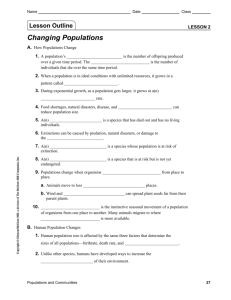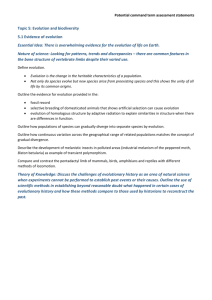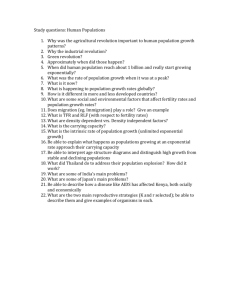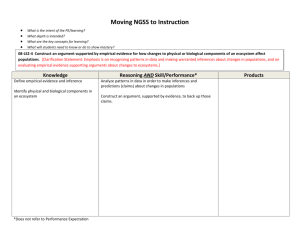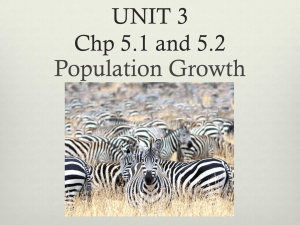Population Health Assessments - Arizona Game & Fish Department
advertisement
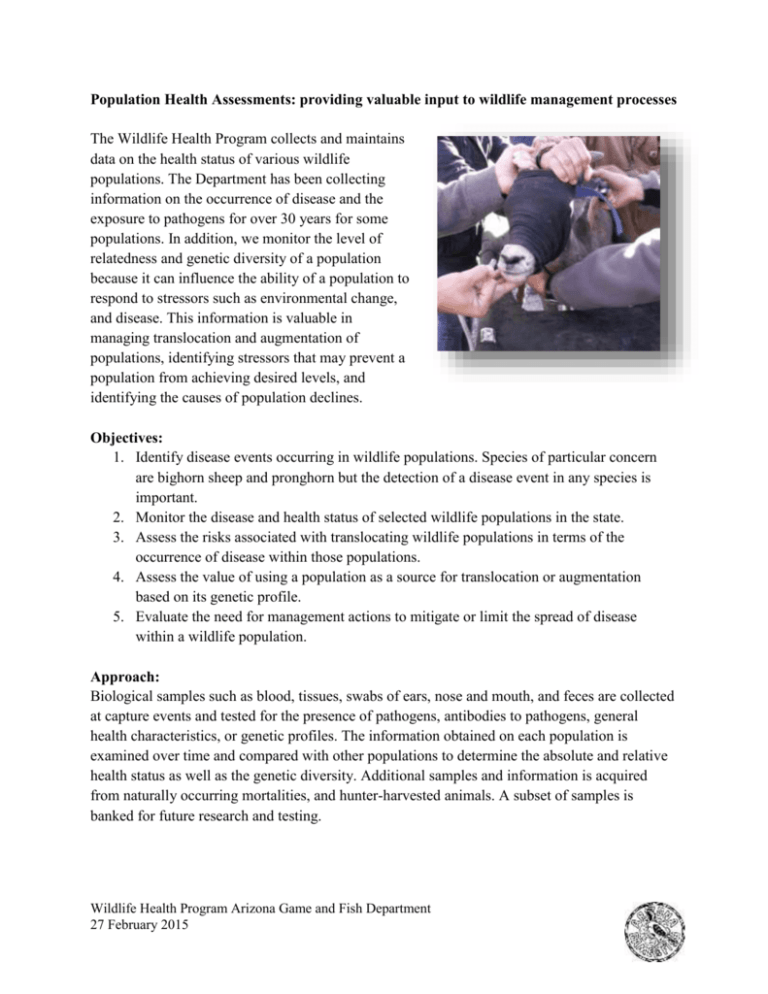
Population Health Assessments: providing valuable input to wildlife management processes The Wildlife Health Program collects and maintains data on the health status of various wildlife populations. The Department has been collecting information on the occurrence of disease and the exposure to pathogens for over 30 years for some populations. In addition, we monitor the level of relatedness and genetic diversity of a population because it can influence the ability of a population to respond to stressors such as environmental change, and disease. This information is valuable in managing translocation and augmentation of populations, identifying stressors that may prevent a population from achieving desired levels, and identifying the causes of population declines. Objectives: 1. Identify disease events occurring in wildlife populations. Species of particular concern are bighorn sheep and pronghorn but the detection of a disease event in any species is important. 2. Monitor the disease and health status of selected wildlife populations in the state. 3. Assess the risks associated with translocating wildlife populations in terms of the occurrence of disease within those populations. 4. Assess the value of using a population as a source for translocation or augmentation based on its genetic profile. 5. Evaluate the need for management actions to mitigate or limit the spread of disease within a wildlife population. Approach: Biological samples such as blood, tissues, swabs of ears, nose and mouth, and feces are collected at capture events and tested for the presence of pathogens, antibodies to pathogens, general health characteristics, or genetic profiles. The information obtained on each population is examined over time and compared with other populations to determine the absolute and relative health status as well as the genetic diversity. Additional samples and information is acquired from naturally occurring mortalities, and hunter-harvested animals. A subset of samples is banked for future research and testing. Wildlife Health Program Arizona Game and Fish Department 27 February 2015 Current health status of selected populations: In calendar year 2014, we collected samples from 292 animals in 13 populations of 9 different species. Most of the samples were collected from bighorn sheep and pronghorn. Additional species represented in surveillance were American bison, Gould’s turkeys, and coyotes. The coyotes tested were from the Aubrey Valley around the black-footed ferret reintroduction site. Coyotes and other predators are tested for exposure to plague, tularemia, and canine distemper to provide information needed to determine the risk to the ferrets and prairie dogs. In 2013, the Department captured and tested sheep in 4 units: 13B (Virgin River), 15D (Black Mountains), 43B (Trigo Mountains), and 44B Plomosa Mountains. We found detected organisms associated with bighorn sheep pneumonia in all of these populations but the rate of detection varied among the populations. For three of the populations (15D, 43B, and 44B), we have done recent health assessments and we have determined that the number of bighorns carrying these organisms is decreasing. We, therefore, believe that the populations are getting healthier and that the risk of a mortality event due to pneumonia is decreasing. Figure: 2013 bighorn sheep health assessment in 4 units Overall pronghorn populations show little evidence of that diseases affect their populations. We have detected intestinal parasites in some groups but the level of parasitism is generally low. The Sonoran pronghorn in Southern Arizona have been affected by epizootic hemorrhagic disease, a viral infection spread by culicoides midges. In response to the occurrence of a small number of mortalities every year, the Sonoran pronghorn project instituted an annual vaccination program. Both serological testing and a decline in mortalities have confirmed that the vaccine is safe and effective. Project Contacts: Anne Justice-Allen, Wildlife Health Program Supervisor, 623-236-7351, ajusticeallen@azgfd.gov Page last updated: February 27, 2015 Wildlife Health Program Arizona Game and Fish Department 27 February 2015
